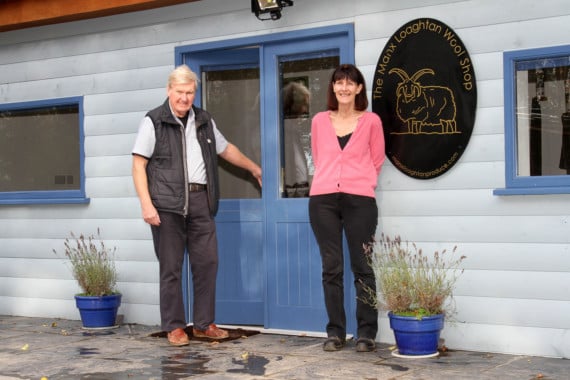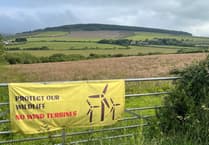Jenny Shepherd and Rawdon Hayne have opened a new farm shop selling wool products and meat from their loaghtans.
The couple farm at Ballacosnahan in Patrick, which has been in Jenny’s family for more than 50 years. This is where they keep the world’s second largest flock of Manx loaghtans, 600 of them, a responsibility which Jenny takes very seriously.
She says: ’I am a guardian for these animals. The breed is not safe and the only way you are going to secure their future is to give them a commercial purpose.’
For Jenny and Rawdon the way to do that was through selling their wool as a premium product. They set up a breeding programme aimed at producing quality wool which is washed and spun at a specialist mill in Yorkshire before being sent to be woven.
Their big breakthrough came when their weaver told them that their wool was good enough to be spun as single ply - the only single ply Manx loaghtan wool in the world.
This has enabled their range of finely-woven blankets, each one containing 1kg of wool, to be made.
Jenny says: ’I’m very proud of our wool. We’re breeding for the best wool, a good staple and a good colour.’
The couple developed a range of blankets, fleeces, balls of knitting wool and knitting kits containing everything you need to make scarves and hats.
They started off selling online and from a makeshift shop in the dining room of their house.
What they hadn’t bargained for was the massive popularity their products would have in the USA, which accounts for 80% of their sales, and it was when coachloads of wealthy Americans from cruise ships began descending on the farm that they realised they would need to provide a purpose-built shop.
The result is a simple, Scandinavian-style wooden building with the products displayed on two beautiful hand-made tables, one elm and one cedar, from trees felled on the farm.
Although they make far more money from the wool than the meat, there is Loaghtan meat also available from a freezer in the shop.
This includes joints, legs and boned and rolled shoulder, loaghtan burgers and sausages and loins which Rawdon says can be cooked very quickly, like fillet steak and which taste delicious.
Jenny says: ’The best loaghtan meat is from an animal aged between two and three years: we always look for one that age when we want a joint for Christmas.’
They have fitted a projector and screen to show a short film they have made about their loaghtans. As a former Hollywood cameraman Rawdon was able to call on his skills for this. Jenny plans to add storyboards showing the history of the Manx loaghtan breed and of the farm.
Jenny inherited Ballacosnahan Farm from her parents and while she was researching the history of the Manx loaghtan breed she came across a strange coincidence.
In the early 20th century the breed nearly died out but was rescued by an enthusiast called Caesar Bacon. Some of his flock was sold to a T E Quirk who Jenny discovered had actually lived at Ballacosnahan in the 1920s.
She met T. E. Quirk’s granddaughter by chance and she gave her a picture of the old standing in the yard of the farm with his loaghtans.
Jenny says: ’He was so proud of his loaghtans.’
The branding they have developed for their products features a simple line drawing of a loaghtan ram, taken from a photograph of Jenny’s favourite ram, Magnus.
’The best one I ever bred. He broke a horn three days before the Royal Show and still won best of breed,’ she says.
Interestingly Jenny says that, when it comes to publicising their brand, they have found Twitter to be much more successful than Facebook.
’It generates so many sales,’ says Jenny.
Because she has always shown her loaghtans they are all very well handled and docile which is useful because many visitors to the farm like to go and see them up close. They are in the middle of a landscaping project which will see a small paddock right outside the shop where they can keep a few sheep for the visitors.
One day this summer five obviously wealthy American women arrived to see the farm and the wool products. Jenny says they spent an enormous amount of money on presents and wool to take home and one of them told her: ’I’d much rather buy things that I know are truly Manx rather than the tourist stuff that’s made in China.’



.png?width=209&height=140&crop=209:145,smart&quality=75)
-(1).jpeg?width=209&height=140&crop=209:145,smart&quality=75)
Comments
This article has no comments yet. Be the first to leave a comment.